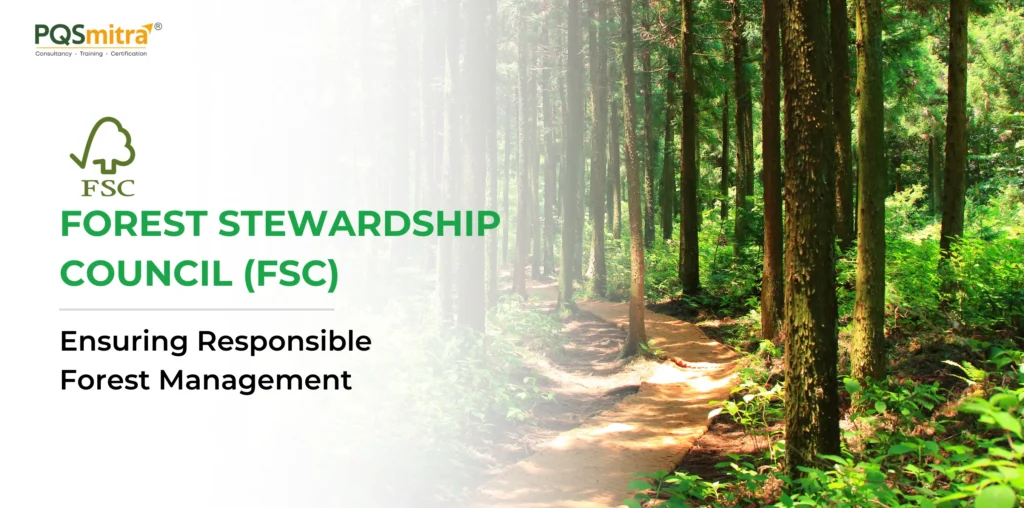
FSC stands for the Forest Stewardship Council which is a non-governmental organization working to promote responsible forest management.
Forests are important as it provides many products, including food, wood, paper, medicine, and recreation space, this things in our day to day life we are getting from forest. FSC is a global forest certification which allows manufacturer and final consumer to know that they using or consuming products which has come from a reputable and sustainable forest source.
The Forest Stewardship Council’s (FSC) mission is to promote responsible forest management that is economically, socially, and environmentally beneficial.
Meaning of FSC Certification:
Choosing FSC (Forest Stewardship Council) certification offers a range of benefits, Environmental Protection, Economic Advantages, Legal Compliance. FSC certification allows transparency throughout supply chain, by ensuring ethical and sustainable manner and also every consumer will aware about the sustainability of product. Certifications include “FSC 100%,” “FSC Recycled” and “FSC Mix” (which can be a blend of FSC-certified, recycled and controlled sources). FSC Certification apply to wood products, non-wood forest products. In FSC certification one of key aspect is tracking of chain of custody for the product that gives assurance that the material is taken from sustainably managed forests. FSC will reflect a logo on material that also defines the material sustainability.
Necessity of FSC:
FSC (Forest Stewardship Council) Essential for ensuring responsible and sustainable forest management practices. Its necessity lies in several key factors:
- Environmental Protection: FSC certification helps conserve biodiversity by ensuring by maintaining ecological functions in managing forest, prevents deforestation, and mitigates the impact of climate change.
- Sustainable Supply Chains: FSC ensures that the products derived from forests (like paper, timber, and other wood products) are sourced sustainably, reducing the demand for unauthorized harvesting or unsustainable wood, by promoting responsible forestry.
- Social Responsibility: FSC certification also considers the rights of indigenous peoples, local communities, and workers. It ensures fair labor practices, safe working conditions, and respect for cultural heritage.
- Consumer Awareness: Because of FSC certification consumer will identify that the consumed products come from well-managed forests, enabling them to make informed choices. The FSC logo on a product evidences that it has met environmental, social standards
- Legal Compliance: FSC-certified products help businesses comply with increasingly stringent international regulations and market demands for sustainable sourcing, avoiding the risks associated with unauthorized logging or unsustainable practices.
- Economic Incentives: For forest owners and managers, FSC certification can open up new markets and add value to forest products by demonstrating commitment to sustainability. Certified products often fetch higher prices due to their environmentally and socially responsible credentials.
Responsible Forest management
Responsible forest management balances ecological, economic, and social needs while preserving forests and their biodiversity. It can help meet society’s needs without depleting natural resources. This refers to the practice of managing forests in a way that balances environmental protection, social equity, and economic viability, adhering to strict standards set by the FSC which ensure that forests are harvested sustainably, without causing significant damage to ecosystems, while also considering the needs of local communities and workers.
essentially, it means managing forests for long-term health and benefit to society, not just short-term profit.
Key aspects of responsible forest management:
- Environmental Sustainability:
- Conservation of Biodiversity: Responsible forest management aims to protect the variety of plant and animal species that depend on forests. This includes safeguarding ecosystems, protecting endangered species.
- Soil and Water Protection: Forests play a important role in maintaining soil health and water quality. Responsible management practices prevent soil erosion, and protect water resources from contamination caused by deforestation.
- Carbon Sequestration: Forests are important for mitigating climate change because they absorb and store carbon dioxide. Responsible forest management ensures that forests remain healthy and continue to act as carbon sinks, rather than releasing stored carbon through deforestation or degradation.
- Social Responsibility:
- Respecting Local Communities: Forest management should recognize and respect the rights of local communities, especially those who depend on forests for their livelihoods. This means respecting their cultural, spiritual, and economic connections to the land.
- Fair Labor Practices: Responsible forest management ensures safe working conditions, fair wages, and the protection of workers’ rights. This includes prohibiting child labor, ensuring proper safety standards, and providing workers with appropriate training.
- Supporting Local Livelihoods: Forests provide resources that many communities rely on for food, medicine, fuel, and income
- Adaptive Management and Monitoring:
- Monitoring and Assessments: Responsible forest management involves continuous monitoring of the forest’s health, biodiversity, and ecological services. Forest managers regularly assess the impacts of their activities on the environment and adjust improve practices as needed.
- Adaptation to Change: Forest management needs to be adaptive, particularly in the face of climate change, forest pests, or changing market conditions. This means being able to adjust management strategies to account for new challenges or opportunities.
Achieving FSC certification is more than just compliance; it’s a commitment to responsible forestry and sustainable business practices. At PQSmitra, we guide organizations through every step of the FSC certification process, ensuring smooth implementation and long-term benefits. By choosing FSC certification, businesses not only contribute to environmental conservation but also enhance their brand reputation and market reach. Let’s work together to build a future where sustainability and success go hand in hand.
Kindly submit a business inquiry online and we will get back to you!
OR
Call us on 022-2893 8687 | +91-9820204373
Looking for a Expert Business Consultant?

